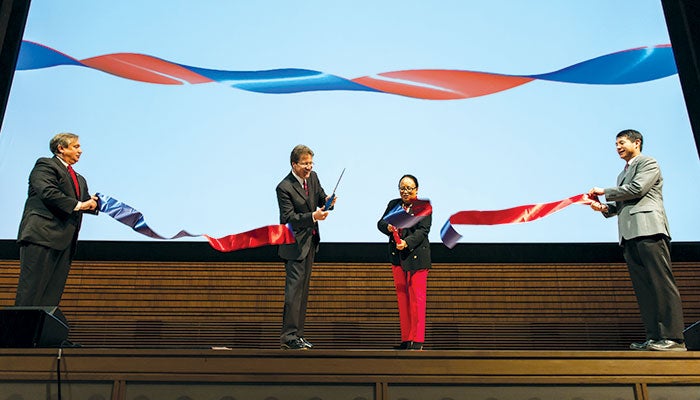 IBM Research has announced plans for a multi-year collaboration with Rensselaer to pioneer new frontiers in the scientific field of immersive cognitive systems. The research collaboration will be housed in the newly established Cognitive and Immersive Systems Lab (CISL) in the Curtis R. Priem Experimental Media and Performing Arts Center (EMPAC).
IBM Research has announced plans for a multi-year collaboration with Rensselaer to pioneer new frontiers in the scientific field of immersive cognitive systems. The research collaboration will be housed in the newly established Cognitive and Immersive Systems Lab (CISL) in the Curtis R. Priem Experimental Media and Performing Arts Center (EMPAC).
CISL’s mission is to explore and advance natural, collaborative problem-solving among groups of humans and machines. The lab is built around a futuristic “Situations Room” that can be adapted to industry-specific environments (including cognitive boardrooms, design studios, diagnosis rooms, and immersive classrooms) and is designed to bring about new ways to improve how people work together.
“With the new lab, we are taking an important step toward a future in which smart machines and smart humans potentiate each other, and the end result is better decisions and outcomes,” said Rensselaer President Shirley Ann Jackson. “We are bringing together two separate strains of emergent technologies to enhance the power of the other: cognitive computing technologies coupled with intensive visual and auditory immersive environments we are developing at Rensselaer.”
 “Cognitive computing is poised to transform every profession, industry, and economy, and immersive cognitive systems will play a vital role in shaping the symbiotic work environments of the future in which critical business decisions will be made,” said John Kelly III ’78, senior vice president of the solutions portfolio and research at IBM. “We are excited to collaborate with Rensselaer on the development of this new frontier as we continue to progress the science that will transform the way professionals around the world work.”
“Cognitive computing is poised to transform every profession, industry, and economy, and immersive cognitive systems will play a vital role in shaping the symbiotic work environments of the future in which critical business decisions will be made,” said John Kelly III ’78, senior vice president of the solutions portfolio and research at IBM. “We are excited to collaborate with Rensselaer on the development of this new frontier as we continue to progress the science that will transform the way professionals around the world work.”
Cognitive computing systems are designed to collaborate with human experts in more natural ways, learn through this interaction, and enable individuals and teams to make better decisions by making sense of massive unstructured data. The CISL platform is an immersive, interactive, reconfigurable physical environment that enhances group cognition. It proactively responds to its occupants by “listening” to and “watching” them, engages multiple users working in small groups at the same time on different aspects of a larger activity, and explores interactions and visualizations that would be impossible with a few people looking at limited screens.
According to IBM, CISL will pursue an exciting agenda for researchers interested in many areas, including user experience technologies and collaborative cognition. It will be led by Hui Su of IBM Research, a leading researcher in the area of cognitive user experience.


